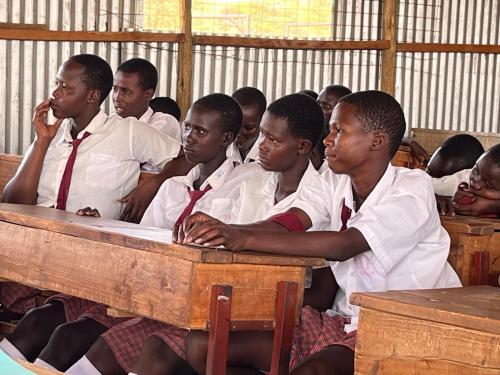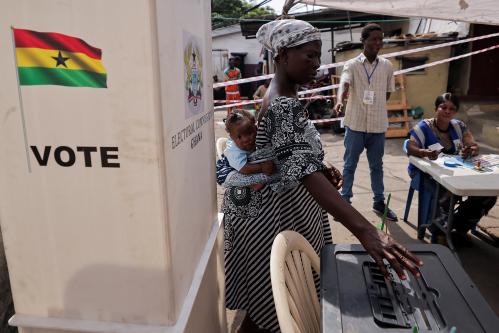

2:00 pm EDT - 3:30 pm EDT
Past Event
The renewal of violence surrounding South Sudan’s fifth anniversary of its independence on July 9, 2016 has led many observers and local stakeholders to question the ability of current peace deals to resolve ongoing factional fighting and consolidate law and order in the fledgling nation. On Wednesday, May 18, the Africa Growth Initiative (AGI) at Brookings held a private discussion entitled, “Navigating the road ahead for South Sudan,” which explored the outlook for the country given recent political developments—namely the formation of a power-sharing transitional government between President Salva Kiir and rebel leader Vice President Riek Machar in late April 2016—as well as the responses from the international development and humanitarian community throughout the crisis.
The discussion centered on the frameworks for peacebuilding in South Sudan, the diverse challenges facing the country in negotiating peace and restarting economic growth, and the transition from humanitarian assistance to resilience and development. It featured a presentation by the Japan International Cooperation Agency (JICA), who is engaged in a diverse array of development programs in South Sudan. Other participants in the discussion included representatives from the U.S. government, multilateral financial institutions, and international humanitarian and civil society organizations.
According to the U.N. Security Council 2009 Report of the Secretary-General on peacebuilding in the immediate aftermath of conflict, several areas where the international community can support conflict-affected countries in their transitions to peace include: basic safety and security, political processes, the provision of basic services, restoration of core government sources, and economic revitalization. Upon its independence in July 2011, South Sudan began implementing its development strategy document, the South Sudan Development Plan (SSDP), which also highlights these areas as its development priorities. The Japan International Cooperation Agency (JICA), as noted by Dr. Furukawa, is one of several bilateral and multilateral stakeholders aligning their support with South Sudan’s plan to promote peace and stability, as well as achieve its development objectives.
JICA is engaging in a number of programs that complement the SSDP and fall under four key pillars: improving basic economy and social infrastructure (by rebuilding water and electricity systems, bridges, roads, and the river port); developing alternative industries (to reduce reliance on oil and support the development of other industries, including agriculture); supporting basic living and livelihoods (by providing skills and vocational training); and strengthening governance and security (by engaging in institutional capacity development of South Sudan TV and Radio, peacebuilding through sports, and helping to resolve of traditional conflict, for instance, cattle raiding). The infrastructure projects, including the expansion of the Juba River Port and construction of the New Nile Bridge in Juba, are scheduled to be completed in 2017 and 2018, respectively.
An interesting point raised by participants during the discussion was that the priorities and programming of different development partners have changed throughout a conflict. For example, the U.S. initially supported the South Sudanese government in capacity building activities; however, once the civil war broke out, it refocused efforts on providing humanitarian support and directly assisting the South Sudanese people. As fighting diminishes, several participants agreed that a focus on agriculture as a key intervention area is important since nearly 90 percent of the South Sudanese population depends on agriculture for their livelihoods.
Participants highlighted some of the many challenges of working in a conflict-affected country such as South Sudan. As Alexander de Waal noted in a 2014 article, South Sudan’s political system can be characterized as a kleptocracy with militarized, corrupt, neo-patrimonial political institutions in which patron client relations are not stable, but are constantly subject to renegotiation. Although there is a transitional government of national unity has formed, which provided some hope for improvements in the security situation, many of the same actors involved in the unity government are the same as those who were in power when the civil war broke out in the first place—and July’s events have flared violence and tensions. Participants therefore raised the question of whether the new government will be able to truly reconcile their differences and govern effectively.
Furthermore, the economic situation remains extremely volatile due to the austerity budget, low oil prices, and fluctuations in the foreign exchange rate. The country has lost nearly all of its foreign reserves, has no revenues, and lacks credibility among financiers, one participant noted. Participants called for greater macroeconomic stability and strengthening of public financial management. Seamless assistance, transitioning from humanitarian aid to more sustainable development is fundamental. Building up the non-oil sector is important to broad-based growth and development.
Future interventions suggested by participants included those that encompass capacity development for core government functions, provision of basic services including social infrastructure, promotion of unity and trust, support to basic safety and security initiatives, and mainstreaming gender parity. A consensus formed around the idea that the security, economic, and humanitarian/social situations needs to be addressed simultaneously, since all of these facets are interlinked. Given the enormity of the challenges facing the security, economic, political, and humanitarian spheres in the South Sudan, however, the question was raised of how this can be done, and how the international community can participate.
Participants offered some recommendations for how this can be achieved throughout the discussion. Disarmament, demobilization, and reintegration (DDR) programming should be prioritized by multilateral development institutions and the South Sudanese government since it addresses several interlinking facets at once: for example, expanding economic opportunities, supporting humanitarian efforts, and improving quality of life for former combatants, as well as victims of violence, to reduce likelihood for a relapse to fighting. For nongovernmental organizations (NGOs) and bilateral/multilateral donors, selecting the right local partners in support of development programming is as important as explaining how the local and international systems work. At the same time, these actors should be careful not to create a two-tiered system, drawing away local talent from the government and local civil society actors to international NGOs. The government should take full advantage of regional markets and integration efforts because South Sudan has joined the East African Community, giving the country greater access to regional markets.
It is possible that JICA and other partners may expand their reach outside of Juba, where most agencies remain, once a clear subsidence in violence takes place. Participants agreed that the recent peace deal enabling the return of opposition forces and Machar to Juba, as well as the establishment of the transitional government, is a major opportunity for the country to consolidate peace and begin pursuing a path toward good governance. Some ministries are already beginning to function again. Unfortunately, the breakout of violence in July seems to have stymied many of these steps forward.
On a positive note, South Sudan will be in the Olympics for the first time. Participants identified several questions that remain, however: How will the opposition and ruling parties work together? Will they be able to build unity and social cohesion, despite the issues of trust and history of corruption? When can DDR begin? Does DDR programming need to wait for a certain level of security to exist before it can be implemented? Who should take the lead on such efforts?

Pamhidzayi Berejena Mhongera, Ellen Chigwanda, Atenea Rosado-Viurques, Jennifer L. O’Donoghue
June 30, 2025

Joyce Kinyanjui, Mary Otieno, Christine Apiot Okudi, Jennifer L. O’Donoghue
June 30, 2025

Oscar Otele, Danielle Resnick, Landry Signé
June 25, 2025